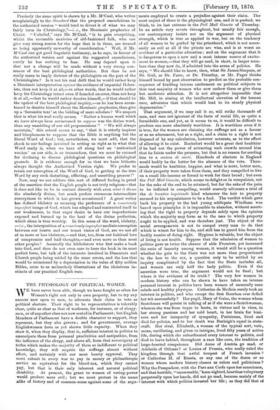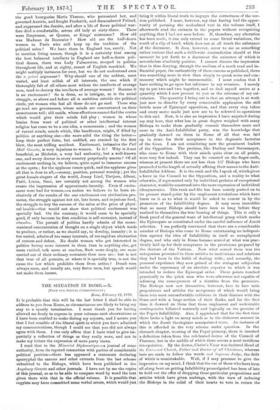THE PHYSIOLOGY OF POLITICAL WOMEN.
WE have never been able, though we have fought so often for Women's right not only to own property, but to try any careers now open to men, to advocate their claim to vote as political electors. Their right to be representatives is tolerably clear, quite as clear as that of workmen, for instance, or of clergy- men, or of any other class not now seated in Parliament; but English Members of Parliament have a double character to support, they represent, but they also govern ; and for government, average Englishwomen have as yet shown little capacity. When they show it, when they display, that is, sufficient interest in politics to emancipate them from personal proclivities and antipathies, from the influence of the clergy, and above all, from that sovereignty of trifles which makes the majority of them so indifferent to political knowledge, they will acquire the suffrage almost without effort, and certainly with our most hearty approval. They must submit in every war to pay in money or philanthropic service an equivalent for the blood-tax, which they cannot pay, but that is their only inherent and natural political disability. At present, the grant to women of voting-power would produce mere evil ; but we must protest in the name alike of history and of common-sense against some of the argu-
ments employed to create a prejudice against their claim. The most unjust of these is the physiological one, and it is pushed, we
think, to its last extreme in the Pall Mall Gazette of Thursday.
In an article very severe throughout, but usually fair enough, our contemporary insists not on the argument of physical strength, which is true as applied to war, but on the tendency of all women to be guided by the priesthood, which is not neces- sarily an evil at all if the priests are wise, and is at worst an accident of a particular education ; and on the argument that it is dangerous to open a new and a most intense source of excite- ment to women,—that they will go mad, in short, in larger num- bers than they now do, if admitted into the arena of politics. He says, "We should like to know, then, what Sir James Simpson, or Dr. Gull, or Dr. Farre, or Dr. Priestley, or Mr. Paget thinks himself bound by past observation to predict as the probable con- sequence of kindling intense excitement on political subjects in that vast majority of women who now eschew them or give them but moderate attention. It is not altogether impossible that Mr. Mill, in aiming at the intellectual elevation of the human race, advocates that which would lead to its steady physical degeneration."
That argument, if we may call it so, will strike thousands of men, and men not ignorant of the facts of social life, as quite a
formidable one, and yet, as it seems to us, it would be difficult to produce one more absolutely worthless. It is worthless even if it is true, for the women are claiming the suffrage not as a favour or as an adornment, but as a right, and a claim to a right is not disposed of by any calculation, however accurate, as to the effect. of allowing it to exist. Rochefort would be a great deal healthier if he had not the power of attracting such crowds around him that he faints under the pressure, but that is no reason for sending him to a maison de sante'. Hundreds of electors in England would bodily be the better for the absence of the vote. Thou- sands would be healthier, happier, and what is more, better men, if their property were taken from them, and they compelled to live on a small life-income or forced to work for their bread ; but even the Pall Mall Gazette, which seems to delight so in compulsion, not for the sake of the end to be attained, but for the sake of the pain to be inflicted in compelling, would scarcely advocate a trial of the de lunatico inquirendo kind whenever the heir to property seemed to his acquaintance to be a fool. The verdict which gave back his property to the bad young addlepate Windham was based upon principles it is impossible to abandon, without assert- ing that the right to property depends solely upon the opinion which the majority may form as to the uses to which property ought to be applied, and was therefore just. The object of the social arrangements is not to compel every man to do that which is wisest for him to do, and still less to guard him from the bodily results of doing right. Hygiene is valuable, but the object of living is not health. Suppose that the admission of women to politics gave us twice the chance of able Premiers, yet increased the ratio of insanity among women, it would still be a question whether the gain to the State was not more than proportioned to the loss to the sex, a question only to be settled by an inquiry complicated by the fact that the State includes all, and women are only half the body politic. Even if the assertion were true, the argument would not be final ; but where is the evidence of its truth ? The very few women in modern history who can be shown to have taken an intense personal interest in politics have been women of unusually sane minds and healthy physique. Catherine de Medicis surely took an interest in politics, and who except the first Bourbon ever defied her wit successfully ? Her pupil, Mary of Guise, the woman whom Scotchmen will persist in talking of as if she were a Scotchwoman, whereas she was from toque to boots, in virtues and in vices, in her strong passions and her cold heart, in her brain for busi- ness and her incapacity of sympathy, Parisienne, lived and died for politics, and to her death was Burleigh's equal in state- craft. Her rival, Elizabeth, a woman of the typical sort, vain, mean, vacillating, and given to intrigue, lived fifty years of active life, during which she subordinated every interest to politics, and died to leave behind, throughout a race like ours, the tradition of large-hearted competence. Did Anne of Austria go mad, or Adelaide of Orleans ? or Louisa of Prussia, who really ruled the kingdom through that awful tempest of French invasion ? or Catherine II. of Russia, or any one of the dozen or so women whom modern history classes as rulers and politicians ? Why the Pompadour, with the Parc sax Cerfs upon her conscience, and that horrible, " unamusable," keen-sighted, heartless voluptuary perpetually upon her hands, did not go mad, because mainly of the interest with which politics invested her life ; as they did that of
the good bourgeoise Maria Theresa, who patronized her, and governed Austria, and fought Frederick, and dismembered Poland, and suppressed the Jesuits, and after a life of fierce political war- fare died a comfortable, serene old lady at sixty-three. These were Empresses, or Queens, or Kings' mistresses ? How old was Madame de Recamier ? How old are the half-dozen women in Paris who still keep up the tradition of the political salon ? We have them in England too, surely. Not to mention living names, though it is a certainty that among the best balanced intellects in England are half-a-dozen poli- tical dames, there was Lady Palmerston, steeped in politics throughout life, and at eighty, sanest of English mankind. We might multiply instances for ever, but we do not understand even the a priori argument? Why should one of the noblest, most varied, and least selfish of all interests, the one which if thoroughly felt of all others most widens the intellects of average men, tend to destroy the intellects of average women ? Because it is an excitement? So is dress, so is intrigue, so is the social struggle, so above and before all is ambition outside the political circle, yet women who feel all these do not go mad. Those who go mad are governesses, whose minds are concentrated on their monotonous toil ; old maids, whose affections cannot find the centre which would give their minds full play ; women in whose brains from want of political or other intellectual interest religion has come to be a one idea, a monomania ; and the women of vacant minds, minds which, like bandboxes, might, if filled by politics or anything else—the more solid the thing the better— keep their perfect form, but unfilled, are crushed by the first blow, the most trifling accident. Excitement, intimates the Pall Mall Gazette, is very injurious to women. Is it? Why is it not beneficial, as Michelet, a very bad authority, but a well-known one, and every doctor in every country perpetually asserts? Of all excitement nothing is, we believe, quite equal to immense success at the opera ; for the applause comes quick, and the applause gives all that is dear to all,—money, position, personal worship ; yet the great female singers of the world, Jenny Lind, Tietjens, Alboni, Patti, Lucca, Sessi, are certainly not among the women who create the impresssion of approximate insanity. Even if excite- ment were bad for women,—a notion we believe to be born ex- clusively of the results of the one excitement our civilization pro- motes, the struggle against hot air, late hours, and injurious food, the struggle to buy the success of the salon at the price of physi- cal health—that would not show that political excitement was specially bad. On the contrary, it would seem to be specially good, if only because its first condition is self-restraint, instead of abandon. The pursuit of politics hardly admits of the mono- maniacal concentration of thought on a single object which tends to produce, or rather, as we should say, to develop, insanity ; it is too varied, admits of too many interests, of too rapid an alternation of success and defeat. No doubt women who get interested in politics betray more interest in them than in anything else, get more excited, talk more at random, flush more deeply, are more carried out of their ordinary restraints than men are ; but is not that true of all pursuits, or where it is specially true, is not the cause the law which prohibits them from action ? Dumb men always seem, and usually are, very fierce men, but speech would not make them insane.

































 Previous page
Previous page